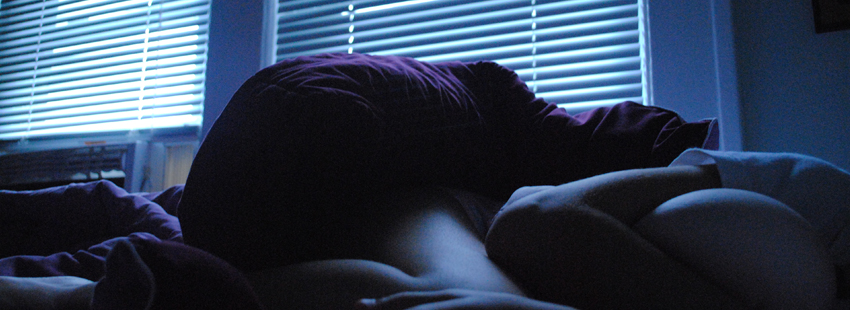“How did you sleep last night?” That’s a question I’ve been asking my wife a lot lately. She’s pregnant, you see, with a little over a month left to go, and her body is less and less her own. She wakes up and can’t go back to sleep, sometimes for hours at a time, and she doesn’t know why. Some literature says it’s simply nature’s way of getting us ready for recurring, ongoing, sleep deficiency with a newborn baby.
Recurring, ongoing, sleep deficiency… lovely.
So you can understand if the topic of sleep has been on my mind a lot lately. I know how important the quality of sleep is to your health, mental acuity, productivity, and general happiness (for a great read on the theory that supports this, see John Medina’s Brain Rules). I’ve battled insomnia over the years, and I’ve spent many nights counting the hours of sleep I would get – if I got to sleep now – until my alarm would go off. “How can you fall asleep so soon?” I would silently ask my wife as she lay there in blissful dreamland, in her pre-pregnancy days. I want to know the secret!
Unfortunately, there is no secret (at least, none that has yet been discovered). Some of us are simply tuned differently. However, there are some things you can do to make sleep as conducive as possible. Read on for nine tips that have been proven to help.
Keep a night-time notepad
A lot of us have trouble sleeping because our minds get all worked up over something we need to do or think about the following day. One way to help your mind relax is to keep a notepad and pen next to your bed. When you catch yourself going down a path and getting anxious about something, just write it down, and tell yourself that you’ll get to it tomorrow. You haven’t forgotten about whatever it was that was making you anxious or revving you up, but you can let it go because your notepad will keep your thoughts safe for now.
Use sleepy time lighting
How ironic is it that one of the last things we do before going to bed is brush our teeth in a brightly lit bathroom? I don’t know about you, but our bathroom at home is probably the least conducive place in the house to get sleepy in. Instead, try installing a nightlight in the bathroom (with at least enough light to let you get the toothpaste onto your toothbrush), and keep the rest of your lights in the house on their lowest level (if you have dimmers), or use low-wattage lamps when it’s near bed time. Likewise, if you get up in the middle of the night to use the bathroom, don’t turn the bright lights on.
Make your bedroom a sleep oasis
Your bedroom should be a sanctuary of rest, relaxation and sleep. Your bed should be comfortable. The room should be decorated in warm colours. There shouldn’t be any distracting lights or sounds. Get rid of anything that has to do with work, your career, school, or the ongoing responsibilities of keeping a home and raising a family. Make sure to keep that stuff elsewhere, outside your bedroom.
Lower your room temperature
Generally speaking, humans sleep better in cooler temperatures. If you are having trouble sleeping, try removing some blankets, or lowering the room temperature a bit. Note that if the room is too cold, this will also impair your sleep. If you are in a cooler, rather than a too-hot room, it should be easier for you to go to sleep, and sleep well throughout the night.
Eliminate screen time before bed
The light that shines out of your various screens (smartphones, tablets, TVs, etc.) is very close to the frequency of daylight, which your brain interprets as daytime and being – and staying – awake. If you want to sleep better, try switching off all your screens 20-30 minutes before you plan on going to bed. Read a book instead of watching TV, call on the phone instead of texting, etc.
Avoid caffeine in the afternoon
If you plan on going to bed any time before midnight, avoid drinking coffee or ingesting a lot of caffeine in afternoon, or any time after 2:30 – 3 p.m. Some people swear that caffeine does not affect them, but if you are having sleep problems, this tip would be one of the first places to start.
Medicate
Melatonin is a natural over the counter supplement that helps to improve the quality of sleep. If you find yourself tossing and turning for 20 minutes after you go to bed, it helps to get up, take a pill, read for a bit, and go back to bed. Try to avoid having your brain associate being in bed to the anxiety of insomnia. There are also stronger, behind the counter medication that your doctor might prescribe for you if insomnia becomes a serious issue. I’ve tried some of these, such as lorazepam and trazodone (both of which are principally used to treat anxiety and depression), with great results.
Avoid alcohol
Even though you might pass out after having too much to drink, alcohol severely disrupts your sleep. Most importantly alcohol impairs your ability to stay in stage four sleep. This is where rapid eye movement (REM) sleep occurs, and where most of your rest and recovery takes place. Also, if you drink before bed, you will have to get up more frequently to use the bathroom, and you will be more likely to sweat and snore (very unpleasant for everyone involved), further decreasing your quality of sleep.
Exercise
Last but not least, get some exercise! Try to work it into your day by walking as much as possible, rather than driving. Bike to work. Find a sport you enjoy. Have fun! You’ll sleep better, be happier, get healthier, and become more productive.
Do you have any other tips to share on how to sleep better? Let me know in the comment section below.
Feature image credit: Photo by Flickr user Lindsay / CC BY-NC-ND 2.0


 Senior communicator | Team leader | Web and social media expert | Strategist.
I love making new professional acquaintances. Reach out if you want to talk communications, marketing, or ultimate frisbee.
Senior communicator | Team leader | Web and social media expert | Strategist.
I love making new professional acquaintances. Reach out if you want to talk communications, marketing, or ultimate frisbee.






Join the conversation